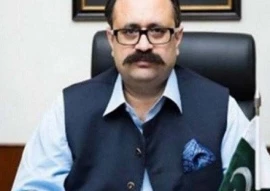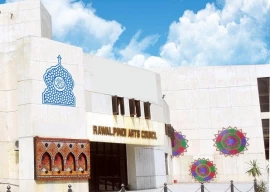
Civil society representatives at a discourse on Saturday resolved that granting more powers to the Azad Kashmir (AJK) government is essential for the state’s socio-economic development, peace and prosperity.
The fourth round of dialogue on a report by Centre for Peace, Development and Reforms (CPDR), titled “An appraisal of constitutional, financial and administrative arrangements between the government of Pakistan and Azad Jammu and Kashmir (AJK)”, was held in the picturesque town of Rawalakot.
Civil society representatives, leaders of various political parties, lawyers, academicians and the representatives of print and electronic media attended the conference amidst reports of shutter-down strike by local traders over prolonged power outages.
Justice (retired) Basharat Ahmed Sheikh highlighted the salient features of the report. He said that the Azad Kashmir Interim Constitution Act 1974 has undermined the status of the AJK government and has rendered it “an ineffective and impotent body with no executive powers”. He explained that the act has given excessive executive and legislative powers to the AJK Kashmir Council over 52 subjects, including taxation.
Moreover, he said the act endows the chairman of the Kashmir Council, who is the serving Prime Minister of Pakistan, the authority to appoint and dismiss the chief election commissioner, auditor general, and the judges of Supreme Court and high court.
“The Prime Minister of Pakistan exercising full authority in AJK is a violation of the constitution of Pakistan. The prime minister of Pakistan is not elected by the people or the elected representatives of AJK and is not even answerable to them,” he said. He added that under article 257 of the Pakistani constitution, Kashmiris have the right to determine what sort of a relationship they want to establish with Pakistan.
Justice Sheikh said that since the induction of the Interim Act, “no one took the pain to examine this document so as to determine its merits and demerits”. Referring to the report prepared by CPDR, Sheikh said that it was incumbent upon every citizen of the state to study and analyze the report.
Former president of Trans-Line of Control (LoC) Joint Chamber of Commerce and Industry, Zulfiqar Abassi, expressed concern over the worsening economic situation of AJK. He said that with 40 per cent of the state’s budget being consumed on administrative affairs, the state’s private sector is on the brink of collapse. He said the government has no policy to facilitate local investors, to whom even the banks are unwilling to give loans. He forewarned that if the private sector is not improved, an estimated 0.2 million youth will be left unemployed in the state in the next five years.
He underscored the need to devolve the Kashmir Council and transfer powers to the AJK government to tackle the economic challenges.
Former minister of AJK, Tahir Anwar, opined that the Kashmir Council secretariat should be shifted to Muzaffarabad and there should be a democratic mechanism for the selection of the council’s chairman.
He also stated that all eminent political parties should take the leading role in addressing the issues of constitutional anomalies to ensure smooth and effective governance in AJK.
While concluding the debate, CPDR Executive Director Ershad Mahmud said the dialogue was aimed at engaging civil society members on how to improve or to modify the existing the relationship with Pakistan. “Although the reality cannot be ignored, we can work together constructively to make the exiting arrangement between the two governments more transparent, acceptable and reliable”, he said.
Published in The Express Tribune, July 1st, 2012.
















1734778885-0/Untitled-(10)1734778885-0-270x192.webp)






COMMENTS
Comments are moderated and generally will be posted if they are on-topic and not abusive.
For more information, please see our Comments FAQ